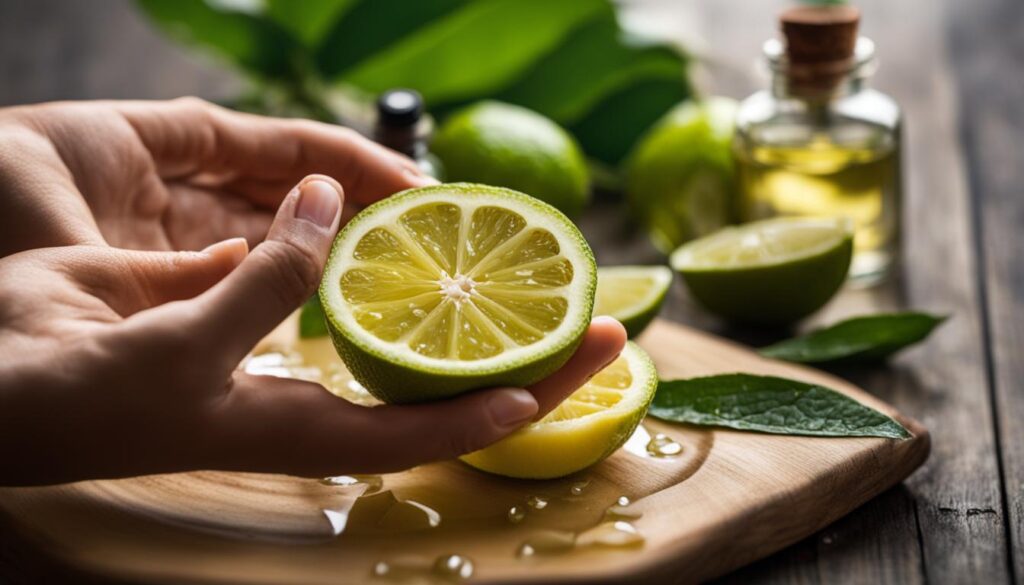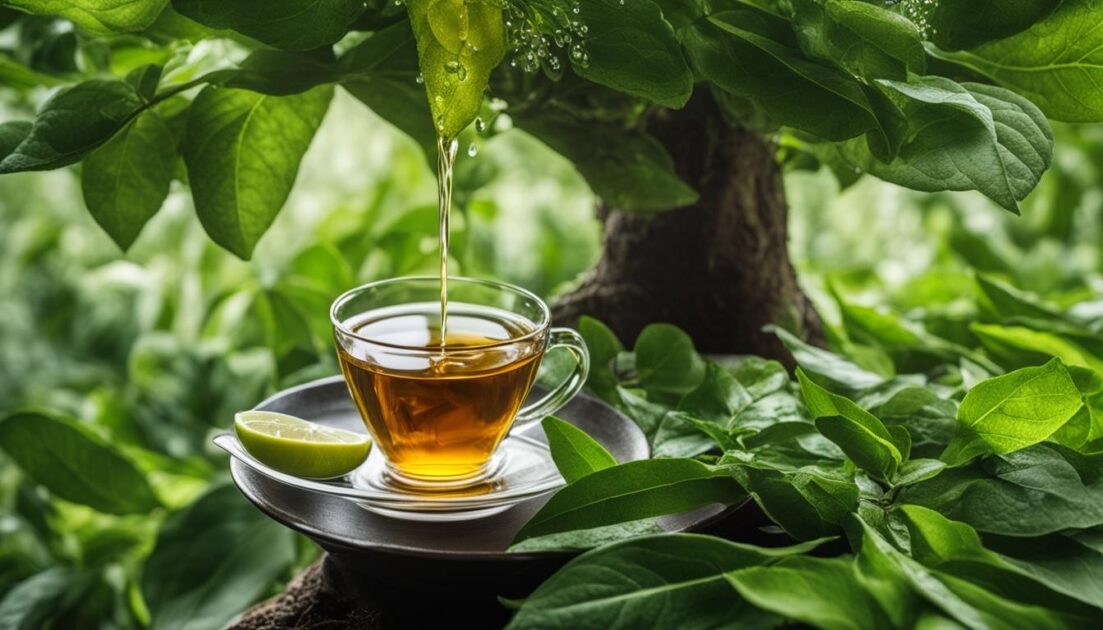Welcome to my comprehensive guide on bergamot oil! In this article, I will explore the various uses and benefits of this popular essential oil. Whether you’re an avid aromatherapy enthusiast or simply curious about the therapeutic properties of bergamot oil, you’ve come to the right place. From its rich history to its diverse applications, bergamot oil has a lot to offer. So, let’s dive in and discover the wonders of bergamot oil together.
Key Takeaways:
- Discover the history and origins of bergamot oil.
- Explore the numerous benefits of bergamot oil for your well-being.
- Learn how bergamot oil is extracted and its different varieties.
- Find out about the various ways to use bergamot oil in aromatherapy, skincare, and haircare.
- Understand the potential contraindications and precautions when using bergamot oil.
History of Bergamot Oil
Bergamot oil boasts a fascinating history that spans centuries. It has been utilized in Italian folk medicine and Ayurvedic medicine for a wide range of ailments, including digestive issues, skin health, and fever. Interestingly, the infusion of bergamot oil into black tea gave rise to the beloved Earl Grey Tea. Today, this fragrant oil is predominantly produced in Calabria, Italy, where it attains unparalleled quality in the global market.
Key Highlights:
Bergamot oil has a rich historical background, dating back centuries.
It was used in Italian folk medicine and Ayurvedic medicine.
The infusion of bergamot oil into black tea resulted in the creation of Earl Grey Tea.
Calabria, Italy, is renowned for producing the highest-quality bergamot oil.
Italian Folk Medicine and Ayurvedic Medicine
Bergamot oil has been an integral part of traditional healing systems. In Italian folk medicine, it was employed to address various health issues, such as indigestion, skin problems, and fever. Similarly, Ayurvedic practitioners utilized bergamot oil for its therapeutic properties, incorporating it into remedies for a diverse range of conditions.
The Birth of Earl Grey Tea
The infusion of bergamot oil into black tea resulted in the creation of the iconic Earl Grey Tea. This popular blend, known for its distinctive flavor and aroma, quickly gained popularity and is now enjoyed by tea enthusiasts worldwide.
Calabria: The Home of Quality Bergamot Oil
Presently, Calabria, located in southern Italy, is hailed as the epicenter of bergamot oil production. The region’s unique climate and soil conditions contribute to the exceptional quality of the oil extracted from the bergamot fruit. This sought-after oil from Calabria is highly regarded and is widely used in various industries, including perfumery, cosmetics, and culinary endeavors.
Comparison of Bergamot Oil Varieties
| Region | Quality | Aroma |
|---|---|---|
| Calabria, Italy | Excellent | Intensely citrusy with floral notes |
| Argentina | Good | Citrusy with a hint of bitterness |
| Brazil | Fair | Moderately citrusy |
| Algeria | Fair | Mildly citrusy with earthy undertones |
| Ivory Coast | Fair | Richer in floral and herbal notes |
| Morocco | Fair | Moderate citrusy aroma |
| Tunisia | Fair | Similar to Moroccan bergamot oil with a touch of spiciness |
| Turkey | Fair | Moderate citrusy scent |
| South-East Asia | Poor | Mildly citrusy with a slight floral aroma |
Bergamot Essential Oil Benefits
Bergamot essential oil offers a wide range of benefits, thanks to its unique composition of chemical constituents. It contains compounds such as limonene, linalyl acetate, linalool, and pinene, which contribute to its therapeutic properties.
1. Relief From Anxiety, Stress, and Depression
Aromatherapy with bergamot essential oil can help reduce anxiety, stress, and symptoms of depression. The pleasant and citrusy aroma of bergamot oil promotes relaxation and uplifts the mood, providing a sense of calm and well-being.
2. Antibacterial and Anti-Inflammatory Properties
Bergamot essential oil possesses antibacterial properties that can help fight against harmful bacteria. It also has anti-inflammatory properties, making it effective in reducing skin inflammation and irritation.
3. Wound Healing and Skin Care
Due to its antibacterial and anti-inflammatory properties, bergamot oil is beneficial for wound healing and skincare. It can help prevent infection and promote the healing process of cuts, scrapes, and minor burns. Additionally, bergamot oil can be used to improve the appearance of scars and blemishes, as well as to nourish and moisturize the skin.
4. Pain Relief and Better Sleep
Inhaling the aroma of bergamot essential oil may stimulate the release of hormones that reduce pain and promote better sleep. This can be especially helpful for individuals suffering from chronic pain or insomnia.
“Bergamot essential oil offers numerous benefits, including relief from anxiety, antibacterial properties, wound healing, and pain relief.”
To enjoy the benefits of bergamot essential oil, it can be used in various ways. It can be diffused using a diffuser, added to massage oils, bath products, or used in skincare and haircare formulations.
Overall, bergamot essential oil is a versatile and beneficial oil to incorporate into your wellness routine.

Extracting Bergamot Oil
Bergamot oil, renowned for its delightful citrusy aroma and therapeutic properties, is extracted from the fruit peel using a process called cold expression or cold-pressing. This traditional method involves carefully harvesting the fruit when it reaches peak ripeness, ensuring the optimal concentration of essential oils in the peel.
During the cold expression process, the bergamot fruit peel is carefully squeezed to release the precious essential oils contained within the peel’s cells. This extraction method has been used for centuries and is known for preserving the oil’s integrity and aromatic qualities.
However, modern extraction techniques have evolved to include alternative methods such as the use of solvents or steam distillation. These methods involve extracting bergamot oil through chemical processes that separate the essential oil from the fruit peel. While these techniques may be more efficient for large-scale production, they may impact the purity and overall quality of the extracted oil.
The following table provides a comparison between the traditional cold expression method and modern extraction techniques:
| Extraction Method | Process Description | Advantages | Disadvantages |
|---|---|---|---|
| Cold Expression | The fruit peel is squeezed to release the essential oils. |
|
|
| Modern Extraction Techniques | May involve solvents or steam distillation to separate the oil from the peel. |
|
|
While the traditional cold expression method remains the preferred choice for extracting high-quality bergamot oil, it’s important to consider the extraction method used when selecting a product for personal use. Opting for oils extracted using the cold expression method ensures the authenticity, purity, and aromatic qualities of the bergamot oil.
By understanding the extraction process and its potential impact on the final product, you can make informed decisions when harnessing the power of bergamot oil for its versatile applications.
Uses of Bergamot Oil
Bergamot oil offers a multitude of uses that can enhance various aspects of your life. Whether it’s for relaxation, skincare, hair care, or even culinary delights, bergamot oil can be a valuable addition to your daily routine.
Here are some of the popular uses of bergamot oil:
- Aromatherapy: Inhaling the soothing aroma of bergamot oil can help you unwind, reduce anxiety, and promote better sleep. It has a calming effect on the mind and can uplift your mood.
- Skincare: Bergamot oil is known for its skin-healing properties. It can be used to treat acne, soothe skin irritations, and even out the skin tone. Dilute it with a carrier oil and apply it topically for best results.
- Hair Care: Adding a few drops of bergamot oil to your shampoo or conditioner can help improve the health of your hair. It promotes hair growth, adds shine, and leaves your hair smelling delightful.
- Culinary: Bergamot oil is a versatile flavoring agent that can be used in cooking and baking. It adds a unique citrusy and floral aroma to dishes, desserts, and beverages.
With its diverse range of uses, bergamot oil is a valuable essential oil to have in your collection. Whether you’re looking to relax, rejuvenate your skin, enhance your hair, or experiment in the kitchen, bergamot oil offers a natural and aromatic solution.
Aromatherapy Recipe for Relaxation:
Create a calming ambiance by combining 3 drops of bergamot oil, 2 drops of lavender oil, and 1 drop of chamomile oil in a diffuser. Let the soothing fragrance fill the air and feel the stress melt away.

Bergamot Oil Varieties
Bergamot oil is primarily produced in Calabria, Italy, and is considered to be of the highest quality. However, this aromatic oil is also grown in other parts of the world, including Argentina, Brazil, Algeria, the Ivory Coast, Morocco, Tunisia, Turkey, and South-East Asia.
The quality and aroma of bergamot oil can vary depending on the region and cultivation practices. Factors such as climate, soil conditions, and harvesting techniques contribute to the unique characteristics of each variety. While Calabrian bergamot oil is renowned for its exceptional fragrance and flavor, other regions also produce bergamot oil with distinct qualities.
Regional Varieties of Bergamot Oil:
| Region | Characteristics |
|---|---|
| Calabria, Italy | Superior quality, rich and vibrant aroma, floral and citrusy notes |
| Argentina | Sharp and tangy scent, slightly less intense than Calabrian bergamot oil |
| Brazil | Refreshing and zesty aroma, slightly sweeter than Calabrian bergamot oil |
| Algeria | Distinctive aroma with earthy undertones, often used in perfumery |
| The Ivory Coast | Intense and spicy fragrance, commonly used in flavored teas |
| Morocco | Subtle and delicate aroma, prized for its relaxing properties |
| Tunisia | Warm and tangy scent with hints of spice, widely used in culinary applications |
| Turkey | Pleasant and soothing fragrance, often blended with other citrus oils |
| South-East Asia | Citrusy and sweet aroma, commonly used in traditional Asian remedies |
Each variety of bergamot oil brings its own unique characteristics, enabling consumers to explore different fragrances and flavors. Whether used for aromatherapy, skincare, or culinary purposes, the diverse range of bergamot oil varieties ensures a rich and versatile experience.
Contraindications for Bergamot Oil
While bergamot oil is widely known for its numerous benefits, it is important to be aware of the potential contraindications associated with its use. Understanding these contraindications can help ensure a safe and positive experience with bergamot oil.
Potential Photosensitivity
One important contraindication to consider when using bergamot oil is its potential to cause photosensitivity. This means that when applied to the skin and exposed to sunlight or UV rays, bergamot oil can increase the skin’s sensitivity to the sun. As a result, it is crucial to avoid sun exposure for at least 24 hours after applying bergamot oil topically to prevent adverse skin reactions.
Possible Skin Irritation
Individuals with sensitive skin may be more prone to experiencing skin irritation when using bergamot oil. The potent nature of this essential oil can sometimes lead to redness, itching, or inflammation in certain individuals. It is recommended to perform a patch test before applying bergamot oil directly to the skin to check for any adverse reactions. If irritation occurs, it is best to discontinue use or dilute the oil further to reduce its strength.
Potential Medication Interactions
Bergamot oil may interact with certain medications, especially those that are metabolized by liver enzymes such as cytochrome P450 3A4. These interactions can affect the metabolism and effectiveness of medications, potentially leading to unwanted side effects or reduced efficacy. If you are taking any prescribed medications, it is crucial to consult with a healthcare professional before using bergamot oil to avoid any potential interactions.
By being mindful of these contraindications, you can safely incorporate bergamot oil into your wellness routine and enjoy its many benefits without any unwanted side effects or complications.
| Contraindications for Bergamot Oil |
|---|
| Potential photosensitivity |
| Possible skin irritation |
| Potential medication interactions |
How to Use Bergamot Oil in Aromatherapy
Bergamot oil is a versatile essential oil that can be used effectively in aromatherapy. Here are some popular ways to incorporate bergamot oil into your aromatherapy practice:
- Mix with a carrier oil: Dilute a few drops of bergamot oil in a carrier oil like coconut oil, almond oil, or jojoba oil. This mixture can be used for a soothing and aromatic massage.
- Add to bath products: Mix a few drops of bergamot oil into your body wash, shampoo, or facial scrubs. This will infuse your bath products with a refreshing citrus scent and provide a delightful aromatic experience.
- Use in homemade candles and air fresheners: Create your own candles or air fresheners by adding a few drops of bergamot oil to melted wax or a baking soda-based air freshener. This will fill your space with a calming and uplifting aroma.
- Create a portable scent: Apply a drop or two of bergamot oil to a bandana or handkerchief and carry it with you throughout the day. You can inhale the scent whenever you need a subtle and soothing pick-me-up.
- Use a diffuser: One of the easiest and most popular methods to enjoy the aroma of bergamot oil is by using a diffuser. Add a few drops to your diffuser, turn it on, and let the gentle mist disperse the fragrance throughout your home or office.
Aromatherapy with bergamot oil can help promote relaxation, reduce stress, and uplift your mood. Experiment with different methods and find what works best for you.
| Methods | Benefits |
|---|---|
| Massage with a carrier oil | Relaxation and tension relief |
| Add to bath products | Aromatic bathing experience |
| Homemade candles and air fresheners | Calming and uplifting ambience |
| Create a portable scent | Soothing pick-me-up on the go |
| Use a diffuser | Whole-room aromatherapy experience |
How to Use Bergamot Oil for Skin and Hair
Bergamot oil offers numerous benefits for both the skin and hair. Whether you’re looking to improve the appearance of your skin or enhance the health of your hair, bergamot oil can be a valuable addition to your beauty routine.
When it comes to skincare, bergamot oil can be diluted in a carrier oil, such as jojoba or coconut oil, and applied topically. It can be used as a spot treatment for acne or wounds, thanks to its antibacterial and wound-healing properties. Additionally, adding a few drops of bergamot oil to your bath water or incorporating it into your soap can help moisturize and protect your skin.

For hair care, bergamot oil can rejuvenate and enhance your locks. By adding a few drops of bergamot oil to your shampoo or creating a scalp massage oil with a carrier oil, you can improve the appearance, softness, and shine of your hair. Furthermore, bergamot oil has a pleasant scent that can leave your hair smelling fresh and invigorating.
| Benefits of Bergamot Oil for Skin | Benefits of Bergamot Oil for Hair |
|---|---|
| – Spot treatment for acne | – Improves hair appearance and texture |
| – Wound-healing properties | – Enhances hair softness and shine |
| – Moisturizes and protects the skin | – Helps stimulate hair growth |
Overall, bergamot oil is a versatile and beneficial essential oil that can be effectively used on both the skin and hair. With its natural properties and pleasant aroma, incorporating bergamot oil into your beauty routine can help you achieve healthy and radiant skin as well as luscious and vibrant hair.
Bergamot Oil Recipes and DIY Blends
If you are looking for effective ways to use bergamot oil, incorporating it into recipes and DIY blends can be a great option. Not only will you be able to enjoy the refreshing and uplifting aroma of bergamot, but you can also harness its therapeutic properties for your skincare and haircare routines.
One way to use bergamot oil is by adding it to your homemade lotions, creams, and balms. By combining a few drops of bergamot oil with carrier oils like jojoba or coconut oil, you can create a nourishing and fragrant moisturizer that can help soothe and hydrate your skin.
Another way to incorporate bergamot oil into your self-care routine is by using it in DIY hair masks, conditioners, and styling products. By blending bergamot oil with ingredients such as argan oil or shea butter, you can create a hair treatment that promotes hair growth, adds shine, and leaves your hair smelling wonderful.
For those who enjoy the art of aromatherapy, bergamot oil can be blended with other essential oils like lavender, tea tree, or chamomile to create unique aromatherapy blends. These blends can be used in diffusers, added to bathwater, or applied to a handkerchief for a soothing and calming experience.
FAQ
What are the benefits of using bergamot oil?
Bergamot oil offers numerous benefits, including reducing anxiety and stress, promoting better sleep, providing antibacterial and anti-inflammatory properties for skincare, and adding a pleasant scent to hair and culinary creations.
How is bergamot oil extracted?
Bergamot oil is extracted from the fruit peel through a process called cold expression or cold-pressing. Modern extraction techniques may also involve the use of solvents or steam distillation.
What are the uses of bergamot oil?
Bergamot oil can be used in aromatherapy to reduce anxiety and stress, as well as in skincare products to treat acne and soothe skin irritations. It can also be added to hair products for improved hair health and growth, and used as a flavoring agent in cooking and baking.
Where is bergamot oil primarily produced?
Bergamot oil is primarily produced in Calabria, Italy, and is considered to be of the highest quality. It is also grown in other parts of the world, including Argentina, Brazil, Algeria, the Ivory Coast, Morocco, Tunisia, Turkey, and South-East Asia.
Are there any contraindications for using bergamot oil?
Yes, bergamot oil can cause photosensitivity, so it is important to avoid sun exposure after applying it topically. It may also cause skin irritation in individuals with sensitive skin and can interact with certain medications, so it is best to consult with a healthcare professional before use.
How can I use bergamot oil in aromatherapy?
Bergamot oil can be used in aromatherapy by mixing it with a carrier oil for massage, adding it to body wash or facial scrubs, using it in homemade candles or air fresheners, or applying it to a bandana or handkerchief for a portable soothing scent. Using a diffuser is also a popular method.
How can I use bergamot oil for my skin and hair?
Bergamot oil can be diluted in a carrier oil and applied topically to the skin as a spot treatment for acne or wounds. It can also be added to bath water or soaps to moisturize and protect the skin. For hair, it can be added to shampoo or used in a scalp massage for stimulating hair growth and enhancing appearance.
Are there any recipes or DIY blends using bergamot oil?
Yes, bergamot oil can be used in various recipes and DIY blends. It can be added to homemade lotions, creams, and balms for skincare. It can also be used in DIY hair masks, conditioners, and styling products. Additionally, bergamot oil can be blended with other essential oils like lavender, tea tree, or chamomile to create unique aromatherapy blends with additional benefits.






